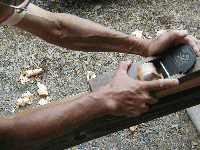鉋
| ||||||||
Translingual
[edit]Han character
[edit]鉋 (Kangxi radical 167, 金+5, 13 strokes, cangjie input 金心口山 (CPRU), four-corner 87112, composition ⿰釒包)
- carpenter's plane
References
[edit]- Kangxi Dictionary: page 1300, character 21
- Dai Kanwa Jiten: character 40292
- Dae Jaweon: page 1803, character 2
- Hanyu Da Zidian (first edition): volume 6, page 4190, character 7
- Unihan data for U+924B
Chinese
[edit]| trad. | 刨*/鉋 | |
|---|---|---|
| simp. | 刨* | |
| nonstandard simp. | 铇 | |
Glyph origin
[edit]| Old Chinese | |
|---|---|
| 袍 | *buː |
| 袌 | *buː, *buːs |
| 軳 | *buː |
| 抱 | *buːʔ |
| 勽 | *buːs, *mɯnʔ |
| 菢 | *buːs |
| 勹 | *pruː |
| 包 | *pruː |
| 胞 | *pruː, *pʰruː |
| 苞 | *pruː |
| 枹 | *pruː, *bu, *bu |
| 飽 | *pruːʔ |
| 泡 | *pʰruː, *m̥ʰruːs, *bruː |
| 炮 | *pʰruːs, *bruː |
| 皰 | *pʰruːs, *bruːs |
| 疱 | *pʰruːs, *bruːs |
| 跑 | *bruː, *bruːɡ |
| 咆 | *bruː |
| 庖 | *bruː |
| 匏 | *bruː |
| 刨 | *bruː |
| 狍 | *bruː |
| 炰 | *bruː |
| 鉋 | *bruː, *bruːs |
| 瓟 | *bruː, *bruːɡ |
| 颮 | *bruː, *pʰruːɡ |
| 鞄 | *bruː, *bruːʔ, *bruːs, *pʰruːɡ |
| 鮑 | *bruːʔ |
| 骲 | *bruːʔ, *bruːs, *bruːɡ, *pʰoːɡ |
| 玸 | *bu |
| 雹 | *bruːɡ |
| 窇 | *bruːɡ |
Definitions
[edit]| For pronunciation and definitions of 鉋 – see 刨 (“to dig; to deduct; to take away; to exclude; etc.”). (This character is a variant form of 刨). |
Japanese
[edit]Kanji
[edit]- a plane (woodworking)
Readings
[edit]- Go-on: ひょう (hyō)←へう (feu, historical)
- Kan-on: ほう (hō)←はう (fau, historical)
- Kun: かんな (kanna, 鉋); かな (kana, 鉋)
Compounds
[edit]- 荒鉋 (araganna)
- 粗鉋 (arashiko)
- 合わせ鉋 (awasekanna)
- 鉋掛け (kannakake)
- 鉋屑 (kannakuzu): wood shavings
- 清鉋 (kiyoganna)
- 刳り鉋 (kuriganna)
- 仕上げ鉋 (shiagekanna)
- 上鉋 (jōshiko)
- 精げ鉋 (shiragekanna)
- 台鉋 (daiganna)
- 中鉋 (chūshiko), 中鉋 (nakashiko), 中鉋 (nakaganna)
- 突き鉋 (tsukiganna)
- 南京鉋 (nankinganna)
- 二枚鉋 (nimaiganna)
- 平鉋 (hiraganna)
- 真鉋 (makana)
- 円鉋 (maruganna)
- 溝鉋 (mizokanna)
- 槍鉋 (yariganna)
- 轆轤鉋 (rokuroganna)
- 脇鉋 (wakiganna)
Etymology 1
[edit]
| Kanji in this term |
|---|
| 鉋 |
| かんな Hyōgai |
| kun'yomi |

Probably from Old Japanese. First attested in the early 900s.[1]
Also encountered with the reading kana[1][2] (see that section for further details).
Pronunciation
[edit]- (Tokyo) かんな [kàńnáꜜ] (Odaka – [3])[2][3][4]
- (Tokyo) かんな [kàńná] (Heiban – [0])[2][4]
- IPA(key): [kã̠nːa̠]
Noun
[edit]- (woodworking tools) a plane
Etymology 2
[edit]
| Kanji in this term |
|---|
| 鉋 |
| かな Hyōgai |
| kun'yomi |
Probably from Old Japanese. First attested in the late 800s.[1]
Possibly originally a compound of 刈り (kari, “cutting, shearing, trimming”, the 連用形 (ren'yōkei, “continuative or stem form”) of verb 刈る (karu, “to cut, to shear, to trim”)) + な (na, “blade”, only attested in compounds). Compare the phonological development of 仮名 (kana) from older form karina.
/karina/ → /kanna/ → /kana/
Pronunciation
[edit]Noun
[edit]- (woodworking tools, possibly dialect) a plane
Usage notes
[edit]The reading kana is still encountered, but the reading kanna appears to be most common in standalone usage as a noun.
References
[edit]- ↑ 1.0 1.1 1.2 “鉋”, in 日本国語大辞典 [Nihon Kokugo Daijiten][1] (in Japanese), concise edition, Tokyo: Shogakukan, 2000
- ↑ 2.0 2.1 2.2 Matsumura, Akira, editor (2006), 大辞林 [Daijirin] (in Japanese), Third edition, Tokyo: Sanseidō, →ISBN
- ^ NHK Broadcasting Culture Research Institute, editor (1998), NHK日本語発音アクセント辞典 [NHK Japanese Pronunciation Accent Dictionary] (in Japanese), Tokyo: NHK Publishing, Inc., →ISBN
- ↑ 4.0 4.1 Kindaichi, Kyōsuke et al., editors (1997), 新明解国語辞典 [Shin Meikai Kokugo Jiten] (in Japanese), Fifth edition, Tokyo: Sanseidō, →ISBN
Further reading
[edit]- Entry at Gogen Yurai Jiten ("Etymology Derivation Dictionary", in Japanese)
Korean
[edit]Hanja
[edit]鉋 • (po) (hangeul 포, revised po, McCune–Reischauer p'o, Yale pho)
- This term needs a translation to English. Please help out and add a translation, then remove the text
{{rfdef}}.
- CJK Unified Ideographs block
- Han script characters
- Translingual lemmas
- Translingual symbols
- Advanced Mandarin
- Chinese lemmas
- Mandarin lemmas
- Cantonese lemmas
- Hakka lemmas
- Hokkien lemmas
- Old Chinese lemmas
- Chinese hanzi
- Mandarin hanzi
- Cantonese hanzi
- Hakka hanzi
- Hokkien hanzi
- Old Chinese hanzi
- Chinese verbs
- Mandarin verbs
- Cantonese verbs
- Hakka verbs
- Hokkien verbs
- Old Chinese verbs
- Chinese terms spelled with 鉋
- Chinese variant forms
- Japanese kanji
- Japanese hyōgai kanji
- Japanese kanji with goon reading ひょう
- Japanese kanji with historical goon reading へう
- Japanese kanji with kan'on reading ほう
- Japanese kanji with historical kan'on reading はう
- Japanese kanji with kun reading かんな
- Japanese kanji with kun reading かな
- Japanese terms spelled with 鉋 read as かんな
- Japanese terms read with kun'yomi
- Japanese terms inherited from Old Japanese
- Japanese terms derived from Old Japanese
- Japanese terms with IPA pronunciation
- Japanese lemmas
- Japanese nouns
- Japanese terms with multiple readings
- Japanese terms spelled with hyōgai kanji
- Japanese terms with 1 kanji
- Japanese terms spelled with 鉋
- Japanese single-kanji terms
- ja:Woodworking
- Japanese terms spelled with 鉋 read as かな
- Japanese compound terms
- Japanese dialectal terms
- ja:Tools
- Korean lemmas
- Korean hanja
